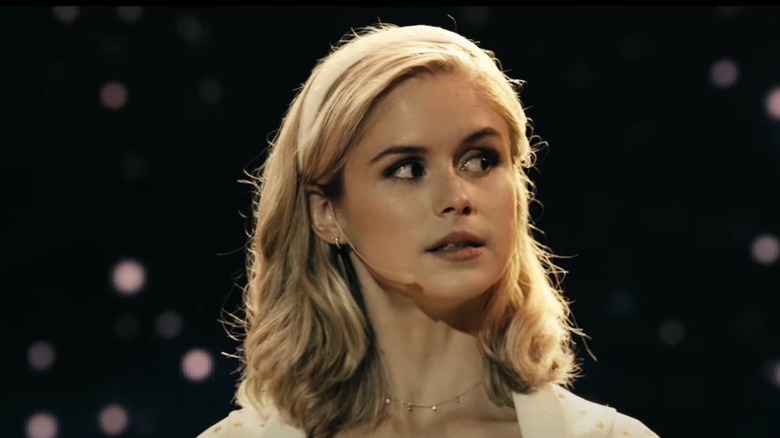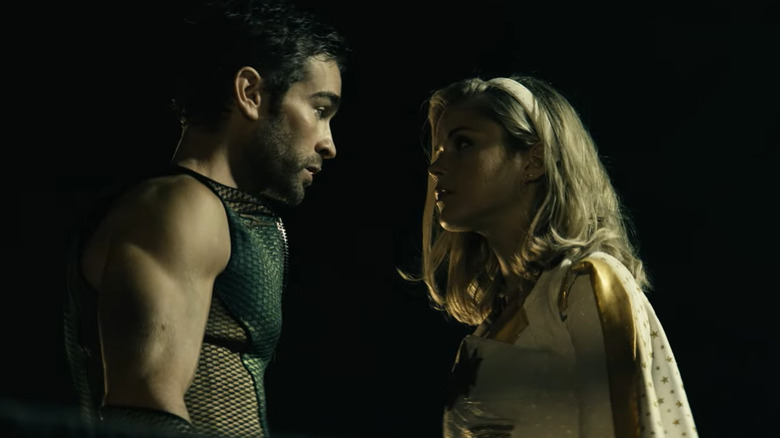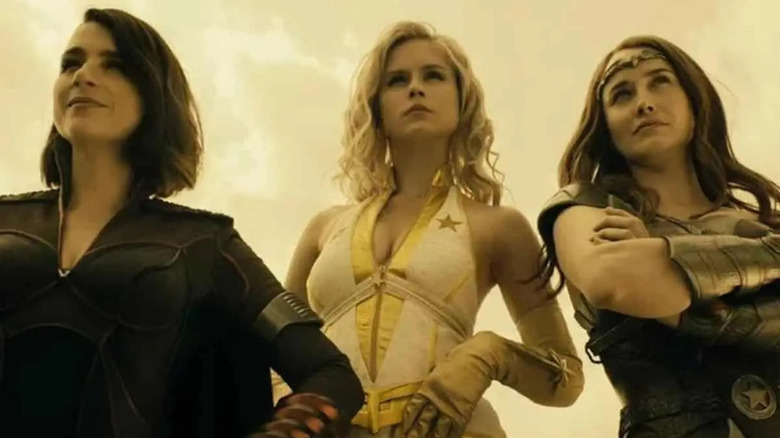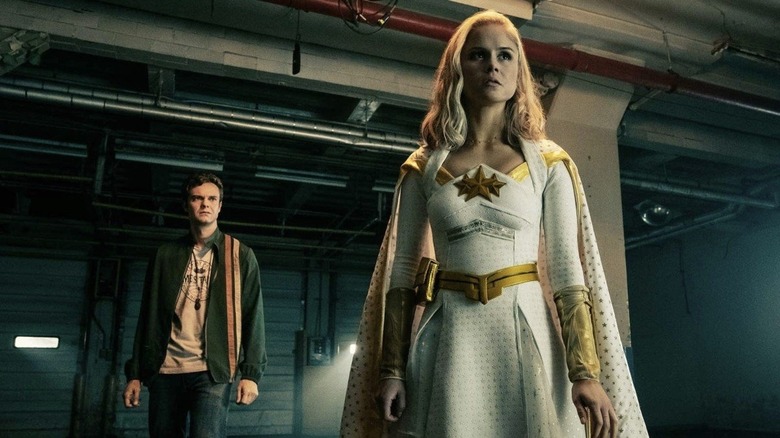A Scene In The Boys Got A Strong Rewrite After Real World Events Changed Everything
The TV show "The Boys" has always been far kinder and more interesting than its comic book source material, and it's with the treatment of Annie, AKA Starlight, that the difference is made the most clear. Whereas Annie in the show is also made a victim of rape as her inciting incident, the show at least never looks down on her for how she initially handled it. TV Hughie never slut-shames her or tries to make her assault about himself; comic book Hughie does both of those things, even breaking up with her and only reconciling with Annie after she begs for his forgiveness. This was not intended as social commentary, by the way. The comics really did expect the reader to sympathize primarily with Hughie throughout this whole ordeal.
Another change was that the show toned down this inciting incident. TV Annie is assaulted by one guy, and it's not shown in much detail; comic Annie gets assaulted by Homelander, A-Train, and Black Noir, all at the same time, almost entirely played for laughs. "Annie started out as a joke," the comics writer Garth Ennis explained in a 2012 interview. "And [she] was actually going to degenerate further in terms of the s**t she'd put up with, the degradations she'd suffer just to be in the world's premier super team." Ennis did start to treat the character "a bit more responsibly" as the comics went on, but the show handled Annie responsibly from day one.
"From the beginning, we always had a lot of female producers," showrunner Eric Kripke explained in a 2019 interview. "One of the first questions we discussed when taking the project is: Are we going to do the moment when Starlight is sexually assaulted? [...] I was nervous. I thought it might be too far."
The original plan
In the end, it was the women on the show's creative team who convinced Kripke to go through with the disturbing initial scene. "Every female producer on the show said, 'You have to do it, because we've all experienced a version of it to varying degrees in our careers.' And I said, 'All of you?' And they said, 'All of us.'"
But in the early stages, they still shied away from Annie ever going public about what happened. "The original storyline in the middle of the season was that Starlight would get payback on The Deep through behind-the-scenes ways inside the corporation [Vought]," Kripke explained. It would've been pretty similar to what happens in the comic, where Annie gets a little bit of revenge against one of her assaulters, A-Train, by temporarily blinding him.
"The women in the room said she can't go public," Kripke said. "We don't live in a world where she's allowed to go public. We were in the middle of writing it all and then the #MeToo movement happened. We revised the whole storyline." While show Annie still gets to stand up to The Deep behind the scenes in the first few episodes, she properly gets her revenge in season 1's fifth episode, "Good for the Soul," in which Annie spontaneously gives a public speech exposing The Deep as a rapist. Although Hughie is impressed by her bravery, this initially seems like a reckless move, one that will cost Annie severely going forward.
Thank god for corporate pandering
Instead, it turns out to be a smart strategic decision, as the image-conscious Vought sees her speech as an opportunity to cynically profit off of feminism. "The Boys" is constantly satirizing how corporations will shamelessly co-opt social justice movements the moment they become profitable. It may be depressing to realize that corporations don't actually care about these important issues but at least it's still possible for Annie to take advantage of shallow corporate girlboss feminism to make her rapist face some sort of accountability.
The Deep (who, strangely, was not part of the group that assaulted Annie in the comics) is still alive and technically part of The Seven in the most recent season of "The Boys," but the show's treatment of him throughout the years has been pretty inspired and surprising. His reputation and standing within The Seven is slowly but surely eroded throughout the first season, to the point where he finishes the first season alone and depressed. He spends the next two seasons flirting around with the idea of a redemption arc but fails at it over and over again.
After being kept from the public eye for most of season 2, The Deep returns from his exile in season 3. After the initial backlash against him, it seems like most Americans in the show's universe have either moved past The Deep's crimes or have been convinced that Annie was lying about it, or that she was just too harsh on him in general. It's a dark yet accurate representation of the backlash to the #MeToo movement in recent years. Luckily, the Deep is still so pathetic — and so terrified of Homelander — that he's still not really winning anything with his return to The Seven.
The hero of her own story
Whereas Garth Ennis had Hughie as the comics' main character, the show elevates Annie to co-protagonist status. Butcher might be the guy in charge who gets all the attention, but its Hughie and Annie who both grow and change the most over the series. It's them the first episode jumps back and forth between, and they've remained the primary focus of the show ever since.
They say the best revenge is a life well lived, and regardless of what happens to Annie going forward, it feels like she's already succeeded in this regard. What happened with The Deep has never felt like it defined her, and unlike The Deep, she no longer lives her life constantly needing to keep Homelander happy. For Annie actor Erin Moriarty, the shocking, potentially off-putting early scene was worth it for the character arc Annie got to have as a result. As she told Huff Post in 2019:
"What does align with the TV show we want to make is creating a story of sexual abuse that shines light on women and exactly what they go through, and how they don't always have to just purely play the victim. They can become stronger people as a result, while also condemning the men who have been perpetuating sexual abuse."
Moriarty also referred to Annie as "the emotional heartbeat of the show," and it's easy to see her reasoning. More so than Hughie or even Frenchie, Annie's always trying to do the right thing and stay true to her own morals, even if it sometimes backfires. It's a vital role for a show as morally convoluted as "The Boys," and it was with her big speech in season 1 that Annie proved she was up to the task.



